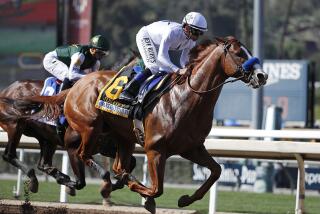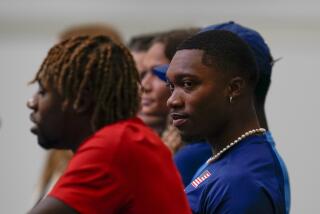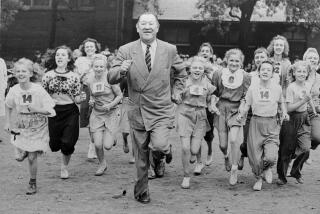Reynolds Out of U.S. Trials : Jurisprudence: Ruling by federal court of appeals will keep 400-meter runner from competing today.
- Share via
NEW ORLEANS — Butch Reynolds, the world record-holder and 1988 Olympic silver medalist in the 400 meters, dropped his long battle to compete in the U.S. Olympic trials Friday night when he lost his case in the 6th U.S. Circuit Court of Appeals.
Reynolds could have run only through a last-minute ruling by the Supreme Court, but his attorney said the case will not be taken that far.
Earlier Friday, Reynolds had vowed to run after winning a preliminary injunction from a federal court judge at Columbus, Ohio that cleared him to compete in the trials.
But Reynolds’ optimistic outlook was quashed by Judge Eugene Siler of the court of appeals in Cincinnati.
Reynolds was suspended for two years by the International Amateur Athletic Federation, the world governing body of track and field, after allegedly testing positive for drugs at a meet in August of 1990. Since then, he has maintained his innocence.
Officials of The Athletics Congress, seeking to prevent Reynolds from competing and “contaminating” the other 31 entrants in the 400 field, including his younger brother, Jeff, appealed to the Cincinnati court after the federal court ruling.
The IAAF’s threat to suspend the runners would, in effect, have meant the United States would have had no 400 runners in the Olympics at Barcelona.
Siler’s ruling virtually ended that possibility, and it was officially ended when Mimi Dane, an attorney for Reynolds, said the fight was over.
“If the Supreme Court overturns the decision of the 6th, which is unlikely, he can run (today),” Doriane Lambelet, a lawyer for TAC, said.
“First, although the plaintiff has shown that unless he is granted preliminary relief, he may be irreparably harmed by not being able to compete in the Olympic trials in New Orleans, nevertheless, he has not shown irreparable harm beyond that, for the IAAF has already indicated that it will not allow him to compete in the Olympics, and there is some question by this court whether the IAAF can be forced to allow the plaintiff to compete in the Olympics, if it could be forced to allow him to compete in the Olympic trials,” Siler said.
“Granting the relief would not further the public interest and would harm other interested individuals, to wit, those competing athletes, Steve Lewis, Danny Everett and Antonio Pettigrew, who have sought to intervene, inasmuch as competition by the plaintiff in the Olympic trials might very well eliminate one or more others who compete.”
In the few hours between court rulings, Reynolds had been confident that he would make the three-man 400-meter team despite the mental stress of the last 21 months. Some other runners in the 400, meanwhile, were concerned about their own Olympic status and whether they would be ruled as “contaminated” by competing against Reynolds.
Now they can run without reservations.
“If he runs, he ends our dream,” Willie Caldwell said. “He’s putting 31 other quarter-milers in jeopardy.
“It’s a tough decision. If I don’t run, I don’t have a shot at the team. If I run, I’m banned. It’s a no-win situation.”
“It’s confusing,” Marlin Cannon said. “We don’t know whether to run or not. The IAAF is very powerful and we don’t know what they’re going to do. We’re caught in the middle.”
Ollan Cassell, TAC executive president, said he was in favor of changing the IAAF’s contamination rule.
“The IAAF shouldn’t be put in a position of going against a court order,” said Cassell, also an IAAF vice president.
More to Read
Go beyond the scoreboard
Get the latest on L.A.'s teams in the daily Sports Report newsletter.
You may occasionally receive promotional content from the Los Angeles Times.






